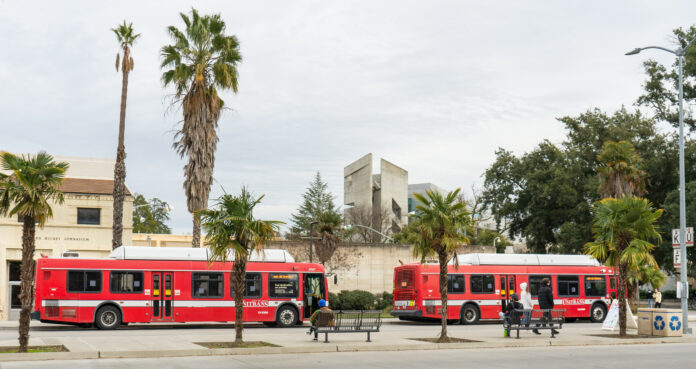Students and alumni share details on the training process and what they’ve learned so far
By LYNN CHEN — features@theaggie.org
Arguably, one of the most important jobs on campus is the Unitrans transit driver. Many students and Davis locals depend on Unitrans to attend classes, run errands or just travel around town. The student-run transportation service is a safe, economical and environmentally conscious option for the city’s residents.
Trainees looking to become a driver must participate in a three-phase training process, according to Miles Riehle, a Unitrans transit driver and a third-year environmental policy analysis and planning major.
First, trainees and a cohort of others hired at the same time undergo in-person classes with a training manager to go over the basics of being a Unitrans employee, what the role will look like and how the training will progress.
Once they are finished with this phase, the drivers-to-be go through one-on-one training sessions with a trainer to earn their Class B licenses free of charge. During this step, trainees learn the mechanics of driving a Unitrans bus and get the feel of the process.
During the third phase, called route training, new employees take control of a bus in service with a trainer beside them.
“The whole process takes about a quarter, depending on how you do it,” Riehle said
Fortunately, despite how long and packed this process seems, Unitrans employees are compensated for their training.
Additionally, transit drivers gain a variety of skills with the experience of training and eventually working with Unitrans.
UC Davis graduate Elaine Pascual recalled what she learned in her time being a transit driver.
“[I] definitely [learned] time management and being able to deal with people in a professional way without being stressed out,” Pascual said.
Riehle reported a similar response to Pascual and further spoke on the professional benefits of the position.
“I feel like my customer service skills got a lot better,” Riehle said, “because you deal with people all the time — whether that’s people who are getting on the bus or people who have questions about where to go.”
He elaborated on this thought, noting that while transit drivers work mostly alone, their position also requires collaboration with their supervisors and other drivers to ensure that services run efficiently and safely.
“You have to be able to talk on the radio […] and have concise communication,” Riehle said. “Just being able to convey what you need to convey very efficiently, I think [that skill] has improved as well.”
Driving is, of course, another skill that is improved upon when trainees join Unitrans.
“[…] I do think that driving a bus makes you a better driver generally,” Riehle said. “On top of that, [the job] gives you a sort of an acute awareness of your surroundings.”
Riehle also explained that maneuvering a bus has allowed him to become more sensitive to other road users while driving.
Additionally, Unitrans drivers have very flexible job schedules that enable them to have a healthier work-life balance. For instance, employees get to choose what time their shifts happen and which lines they would like to operate.
“[This] makes my schedule a lot more malleable,” Henry Guo, a third-year animal science major and current transit driver and route trainer at Unitrans, said. “I just need to pick up the minimum requirements [for shift hours]. If I have a heavy quarter, I wouldn’t pick up that many [hours], [but] if I have a light quarter, I can pick up more hours and get paid a little more. I get to prioritize [my schedule].”
Overall, being a transit driver for Unitrans demands skills on the road as well as with people, but there are also benefits that come with the job. To some, however, another bonus comes from just being able to transport passengers to where they need to be.
“There’s some pride that comes with driving your fellow students,” Riehle stated. “It’s a very cool position.”
Written by: Lynn Chen — features@theaggie.org




